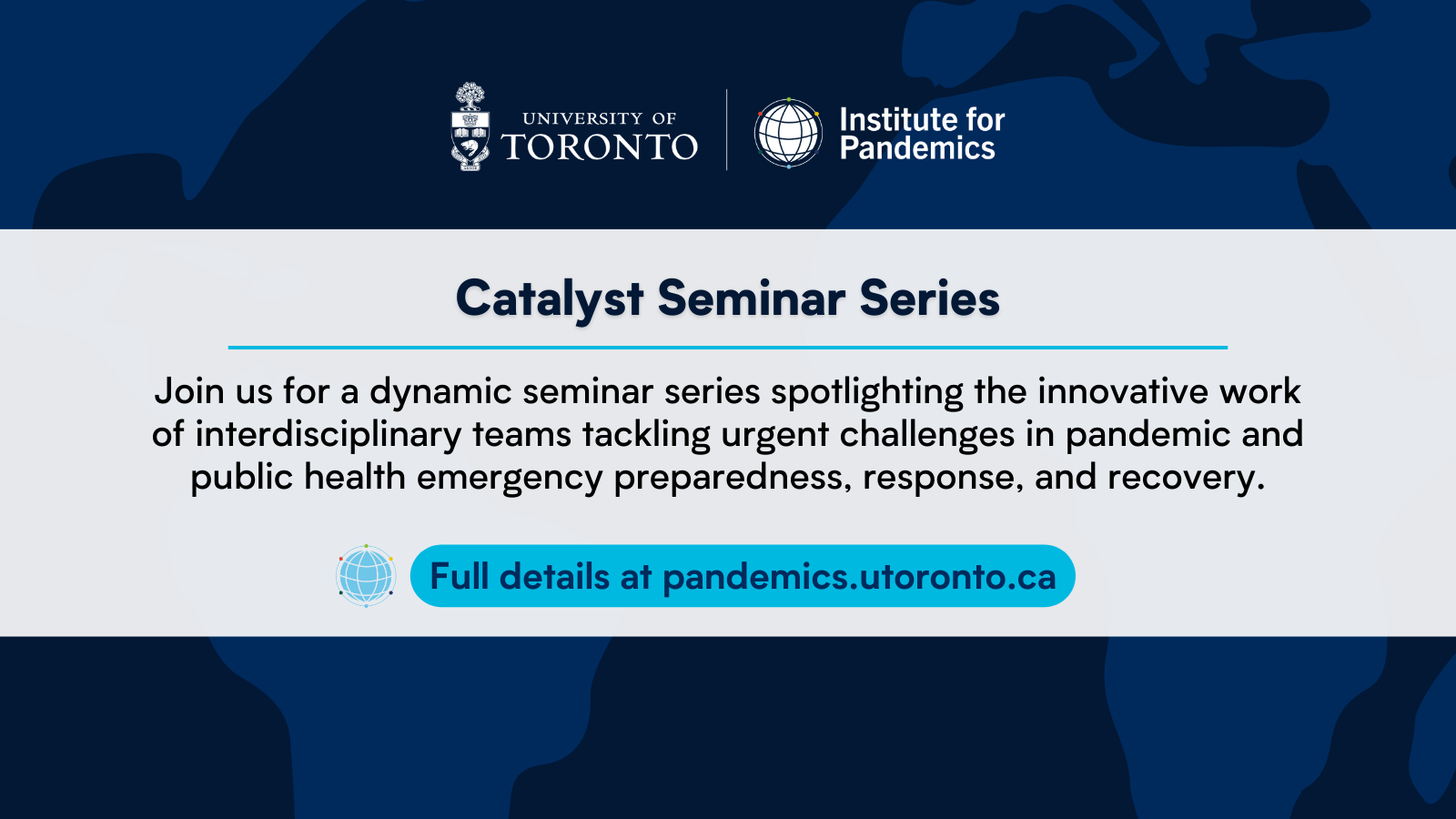
Catalyst Series
Join us for Catalyst Series, a dynamic seminar series showcasing groundbreaking research funded by the Institute for Pandemics' (IfP) Catalyst and Research Development Grants. Since 2023, IfP has provided over $1 million to research teams at the University of Toronto, to support collaborative, interdisciplinary research projects. These presentations spotlight the innovative work of interdisciplinary teams tackling urgent challenges in pandemic preparedness, response, and recovery.
From data-driven public health strategies to community-based interventions and novel biomedical approaches, each session will feature compelling insights from researchers whose projects are shaping the future of public health resilience.
What to Expect
- Engaging presentations from Phase 1 and Phase 2 Catalyst Grant recipients
- Opportunities to connect with leading experts across disciplines
- Discussions on real-world impact and future directions
Format
From October 2025 through March 2026, there will be six online seminars. Each seminar will include presentations representing two awarded catalyst grant projects with a similar theme. Following both presentations there will be a 15-minute question and answer period.
Be part of the conversation that’s driving change in pandemic science and policy.
Click on the date(s) below for the link(s) to register.
Seminar Dates & Details
October 17, 2025 - Long-COVID
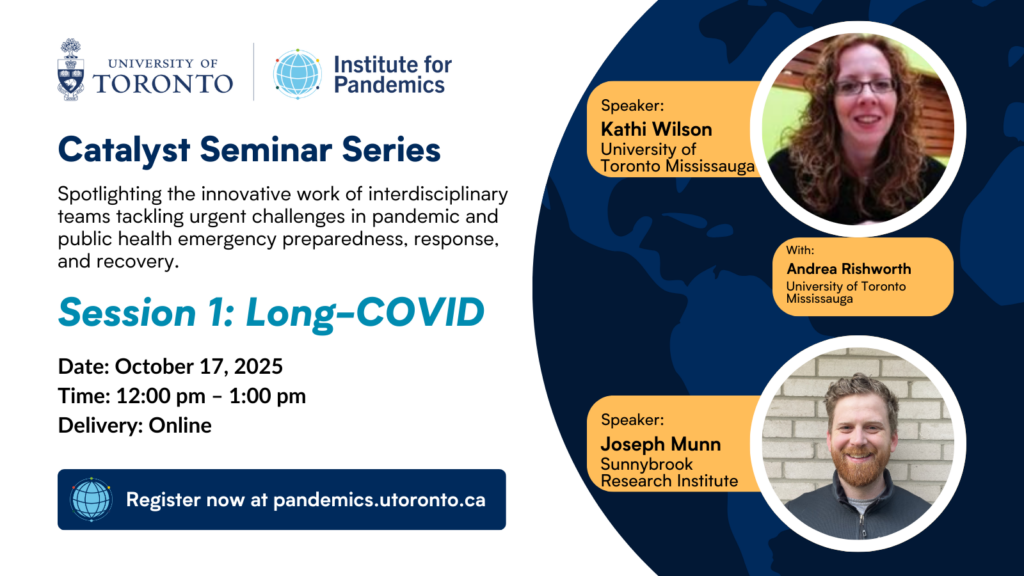
Projects highlighted
Understanding the impacts of structural racism on (im)migration and racialized population living with Long-COVID in Peel Region: A community-centred approach
- Presenters: Kathi Wilson/Andrea Rishworth (University of Toronto Mississauga)
- This project addressed two urgent, yet underexamined issues in Canada – structural racism and long COVID (i.e., Post-COVID Condition (PCC)). The overarching goal of the research was to identify solutions to PCC management that address the intersecting social, structural, and health needs of immigrant and racialized populations in Peel Region, Ontario.
Investigating Post-COVID-19 Condition in Ontarians and Marginalized Communities
- Presenter: Joseph Munn (Sunnybrook Research Institute)
- Background: Many individuals diagnosed with COVID-19 experience symptoms that last for an extended period of time. These extended symptoms are frequently referred to as Long-COVID, officially known as Post COVID-19 Condition (PCC). PCC is a complex disease that requires the involvement of multiple medical specialties to be properly managed and places a substantial burden on provincial healthcare systems. Ontario developed a new healthcare billing code to specifically identify PCC.
- Objectives: The objectives of this study were to understand 1) which doctors used the PCC billing code 2) how many individuals were diagnosed with PCC in Ontario, and if these people belong to disadvantaged groups 3) how much and what types of healthcare people with PCC were using.
November 11, 2025 - Impacts on individuals with disabilities
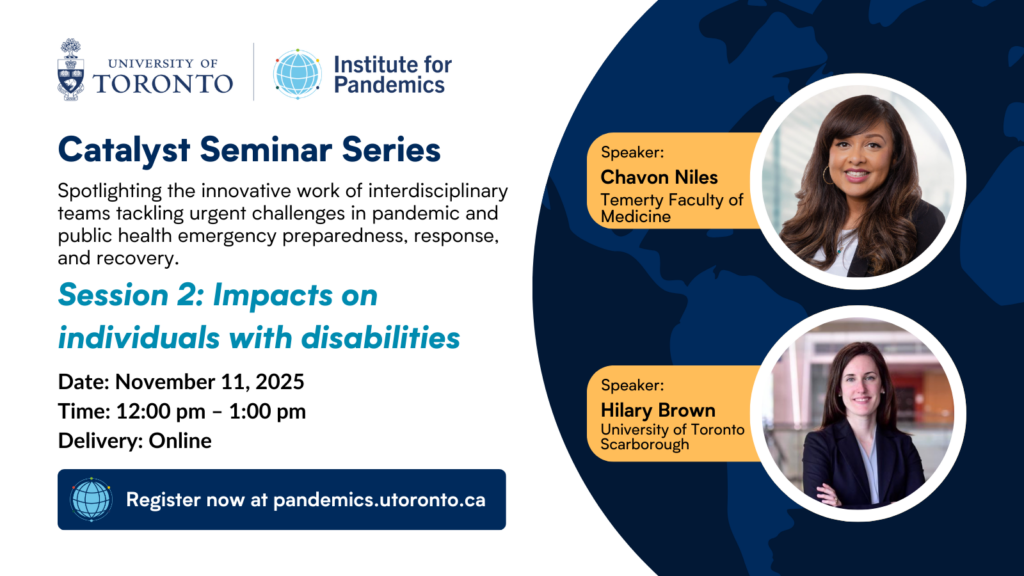
Projects highlighted
Addressing Health Inequities for Black and Racialized Immigrants with Disabilities During and Beyond COVID-19 in Ontario
- Presenter: Chavon Niles (Temerty Faculty of Medicine)
- Background: The COVID-19 pandemic exposed and deepened longstanding inequities in healthcare access and outcomes, disproportionately affecting underserved communities (Subedi, Greenberg, and Turcotte, 2020). In Ontario, Black and racialized immigrants with disabilities experienced compounded barriers shaped by racism, ableism, and immigration status. These intersecting oppressions limited access to healthcare, rehabilitation, and social services, while also creating cascading impacts on mental health, economic security, and social participation.
- Objective: Through narrative inquiry and storytelling, we conducted in-depth interviews with Black and racialized immigrants with disabilities in Ontario, centering their lived experiences as sites of knowledge and expertise. This approach challenges dominant societal narratives that often marginalize or erase these communities (Dossa, 2009). By amplifying participants’ untold stories, the study generates insights that can inform culturally responsive health interventions, guide equitable policy development, and strengthen pandemic and public health emergency planning.
Impact of the COVID-19 Pandemic on Clinical Outcomes of Patients with a Disability Hospitalized on a Medical Service
- Presenter: Hilary Brown (University of Toronto Scarborough)
- Background: The World Health Organization (WHO) estimates there are 1 billion people with a physical, sensory, or developmental disability globally. In North America, the prevalence of disability is 20%, with one-third of individuals over 65 years having a disability. While evidence suggests people with disabilities are at elevated risk for acquiring and suffering severe outcomes associated with COVID-19, the impact of the pandemic on hospital care and outcomes for patients with disabilities more generally received little attention. Research in the general population shows communication failures contribute to patient harm, and pandemic conditions may have disproportionately hindered communication for patients with disabilities via restricted visitor policies and facemasks and face shields that impede communication. People with disabilities have also experienced disruptions to outpatient clinical, personal care, meal, and medication services that have had a profound impact on their well-being. These issues may contribute to elevated risk of adverse clinical outcomes in patients with disabilities on a medical service.
- Objective: Using health administrative data, we examined the impact of the COVID-19 pandemic on clinical outcomes (in-hospital mortality, intensive care unit [ICU] admission, hospital length of stay [LOS], unplanned 30-day readmission) of patients with and without a disability admitted to a medical service for non-COVID-related illnesses.
December 9, 2025 - Artificial Intelligence and Data

Projects Highlighted
Transforming Patient and Provider Experiences into Actionable Insights for Pandemic Readiness, Resilience, and Recovery with an AI-Enabled Hospital System
- Presenter: Zahra Shakeri (Dalla Lana School of Public Health)
- Hospitals are essential in supporting communities during public health crises, and patients' experiences provide important insight into the broader challenges shaped by social determinants of health (SDoH). This research applies AI-supported analysis to more than 111,000 open-text comments collected from Ontario hospitals between 2017 and 2021. By comparing feedback before and during the COVID-19 pandemic, we identified how barriers related to access, equity, and communication affected patient care and intensified under pandemic pressures. The findings point to opportunities for hospitals to strengthen continuity of care, improve responsiveness to diverse populations, and build public trust. In future phases, this work will contribute to the development of an intelligent, patient-centered system that incorporates SDoH into hospital preparedness and recovery planning. Such a system can advance health education, counter misinformation, and guide preventive actions, supporting a more resilient and equitable healthcare system for Canadians.
Predicting Outbreaks in Shelters: Development and data-driven testing of a computational model of airborne SARS-CoV-2 spread
- Presenter: Swetaprovo Chaudhuri (Faculty of Applied Science & Engineering)
- Shelters face the perfect storm during epidemics like COVID. This is in part due to the density of shared living quarters in shelters and high turnover within shelters. One barrier to rapidly mobilizing and activating a response in shelters was that front-line teams were not sure how big a shelter-outbreak could get. We developed an analytic and computer model that shelter and public health teams could use to predict (1) the chance of an outbreak occurring; (2) how many people may get infected in the shelter after one case is found; and (3) what it would take to shrink the size of an outbreak once started or prevent an outbreak from ever starting. Our model uses dynamics of airflow to capture key factors that shape airborne virus transmission related to physical space, crowding, ventilation – alongside the biological properties of the virus itself. We built and tested the model with real-world SARS-CoV-2 data in Toronto from surveillance, shelters, and persons experiencing homelessness as part of a cohort study. The model can be used to test the impact of intervention measures that could be activated after the detection of the first case in a shelter, or what structural measures need to be put into place to prevent outbreaks before they occur. The model supports public health and front-line teams at shelters in their readiness during the current and evolving SARS-CoV-2 pandemic - to predict, react, but also to prepare.
January 13, 2026 - Supporting Vulnerable Populations
Projects Highlighted
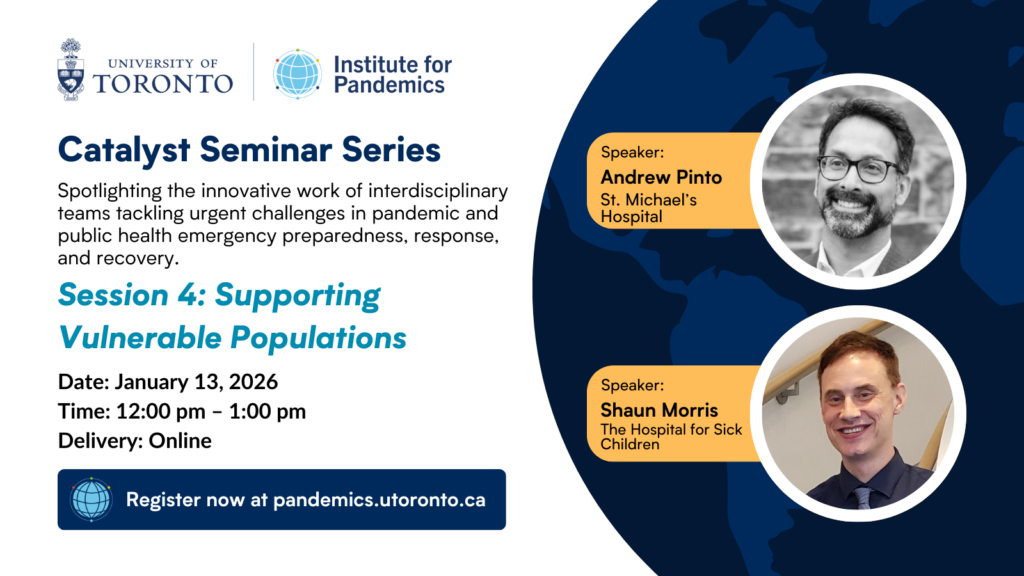
Understanding the Impact of COVID-19 on Communities Made Vulnerable by Social and Economic Conditions and the Subsequent Policy Response in Canada
- Presenter: Andrew Pinto (St. Michael’s Hospital)
- Reports quickly emerged in spring 2020 that COVID-19 was disproportionately impacting communities made vulnerable by social and economic policies. In the early phase of the pandemic, we conducted a rapid review of the international literature on the social determinants of COVID-19 infection, published between December 1, 2019 – June 25, 2020. We found strong associations between race or ethnicity, socioeconomic deprivation, occupation and other social determinants and COVID-19 incidence and hospitalizations. In response to this and other evidence, members of our study team also developed robust guidelines for Canadian policymakers on how to mitigate the impact of the pandemic on these communities. Since the review and guidelines were published, a large number of additional reports and studies were published on how the pandemic impacted racialized, low-income and non-healthcare workers who could not shelter at home. However, no study created a detailed picture of the impact of the COVID-19 pandemic on these communities in Canada. And no research has been conducted on whether Canadian jurisdictions implemented policies to support equitable recover. The products of this research will help create a foundation for future research on interventions to improve pandemic preparedness in a way that engages communities made vulnerable by social and economic policies.
Leveraging Data Science to Improve Vaccine Equity and Pandemic Preparedness Among Children Who are Newcomers to Canada
- Presenter: Shaun Morris (The Hospital for Sick Children)
- Immunization is one of the most important tools to support healthy childhood, benefiting both individuals and populations. Pandemic preparedness requires understanding of whose immunizations are complete and whose have gaps. Vaccine records for the many migrants that Canada receives each year may be in other languages, scripts, and formats, making their translation and interpretation more challenging and time-consuming than most providers and public health units can handle. The resulting immunization documentation delays posed by translation and interpretation challenges introduce infectious disease-related risks to individuals and populations both during, and between, pandemics and can prevent children’s access to school in Ontario due to provincial legislation. As a result, many newcomer families that are already at elevated risk of vaccine-preventable diseases experience delays in updating their children’s routine vaccines, entering school, and integrating into their new communities, thus exacerbating inequity, and limiting pandemic readiness. This presentation will describe the early steps to develop a data science driven tool to better address the issue of challenges in translating international vaccination records.
February 10, 2026 - Women & Children
Projects Highlighted
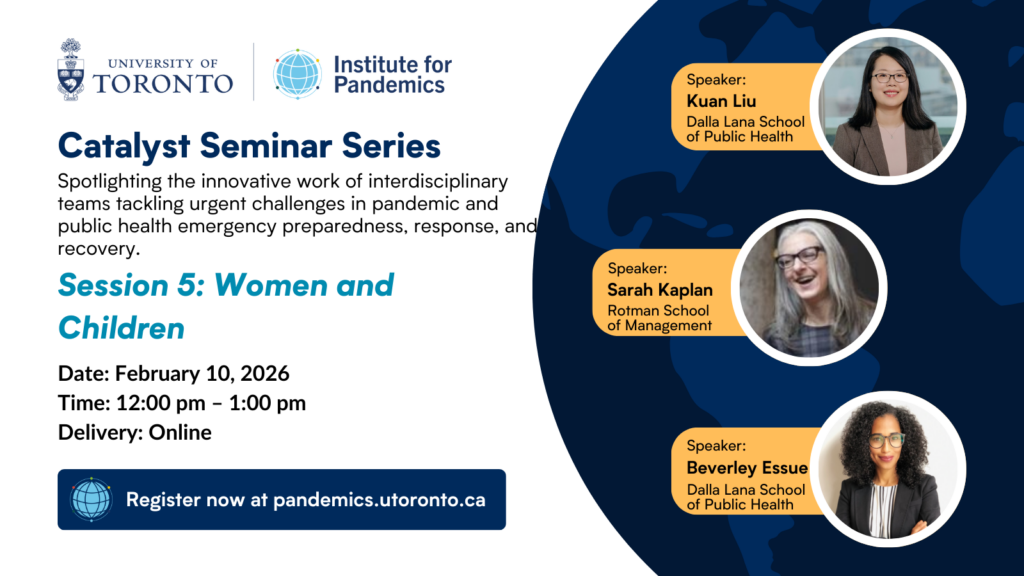
Evaluating Equity-focused Impacts of COVID-19 Pandemic on Childhood and Youth Mental
Health in Canada
- Presenter: Kuan Liu (Dalla Lana School of Public Health)
- It is widely understood that the pandemic precipitated an unprecedented mental health crisis among children and youth both in Canada and around the world. However, there is little evidence on the long-term impact that pandemic containment measures have had on childhood and youth mental health. Our study evaluates changes in the mental health of children and youth in Canada pre- and post-pandemic, the potential causal role that education disruption played, and identifies who were most affected. To that end, we analyzed Ontario electronic health records data linked with administrative population data on demographic and socioeconomic variables, to characterize changes in mental health outcomes among school-aged children and youth during and after the pandemic and to estimate the role that education disruption played on mental health outcomes.
Shedding Light on the “Shadow Pandemic”: Developing a research agenda on gender-based violence during and after COVID-19
- Presenter: Beverley Essue (Institute of Health Policy, Management and Evaluation)
- Co-leads: Beverley Essue (Institute of Health Policy, Management and Evaluation) and Sarah Kaplan (Rotman School of Management)
- Background: Before COVID-19, violence against cis and trans women, Two-Spirit and gender-diverse people was already a crisis. Globally, the pandemic intensified this crisis through job loss, financial insecurity, and quarantining measures. The United Nations deemed this pandemic-fueled rise in violence as a “shadow pandemic,” with marginalized communities, including low-income, Indigenous, racialized, and LGBT+ people, facing increased risks and worse outcomes from gender-based violence (GBV).
- Objectives: This project aimed to address the IfP theme of pandemic recovery by convening a research roundtable to foster research collaborations on GBV and pandemic recovery. The research roundtable brought together interdisciplinary researchers and practitioners from the university and community to explore and define health, economic and social drivers and impacts of GBV, especially those that were heightened during the pandemic-fueled rise in GBV among communities facing marginalization. This engagement identified policy opportunities to support recovery from GBV and prevent rising GBV in future pandemics and more generally.
March 11, 2026 - Social Networks and Misinformation
Projects Highlighted

Empowering Recovery: Enhancing health literacy and social networks for black gay, bisexual, MSM (BGBM) in Ontario
- Presenter: Lance T. McCready (Ontario Institute for Studies in Education)
- This research project, led by Dr. Lance McCready and Dr. Notisha Massaquoi in collaboration with the Black Gay Men’s Network of Ontario (BGMN), enhances pandemic resilience and recovery among Black gay, bisexual, MSM (BGBM) in Ontario by focusing on two critical areas: health literacy and social networks. The COVID-19 pandemic disproportionately impacted two spirit, lesbian, gay, bisexual, transgender, intersex, queer and additional people who identify as part of sexual and gender diverse communities (2SLGBTQIA+), specifically BGBM exacerbating long-standing health disparities, particularly related to HIV/AIDS and other sexually transmitted infections (STIs), while straining existing support systems. Building on BGMN’s successful virtual programming developed during the pandemic, this project repurposes this content and develops new content and events using a popular education framework to improve BGBM health literacy and foster social connections. The project uses a community-based participatory research approach that involves community members in all stages of the research, ensuring that the interventions are culturally relevant and responsive to the needs of BGBM in Ontario. This project generates evidence on how enhanced health literacy and strengthened social support networks can contribute to pandemic recovery and readiness. The outcomes of this research provide actionable strategies for reducing health disparities and improving access to care, ensuring that BGBM are better equipped to navigate future health crises. This project not only addresses immediate recovery needs but also contributes to the long-term resilience of a historically marginalized community, offering insights that can inform broader public health initiatives.
Improving resilience to misinformation to facilitate effective communication with the public
- Presenter: Li Shu (Faculty of Applied Science & Engineering)
- To facilitate effective public-health communication, we explored ways to increase public resilience to misinformation. We aimed to address 1) confirmation bias when people consume information, 2) misinformation that has taken hold in individuals, and 3) social conformity to behave in ways inconsistent with accurate information. This presentation will focus more on 1), and include results as available for 2) and 3). Individuals are subject to confirmation bias when they assimilate information. For example, those who do not (want to) believe that a disease is harmful will seek and preferentially attend to information that minimizes harm. We examined whether prompting self-reflection on past confirmation bias, followed by brief debiasing training, could reduce biased online-information selection, and shift COVID-19 risk perceptions. We also explored how individual cognitive differences affect information selection and risk perception. The self-reflection intervention did not lead to significant changes in risk perception compared to the control condition. However, risk perception for all participants significantly increased after an information-selection task. These results suggest that limited information exposure, rather than confirmation bias alone, played a critical role in shaping participants' risk perception. Analyses of results also highlight the need for more cognitively aligned public-health messaging, particularly in contexts with evolving health information.
🌐 Learn more about the featured projects:
